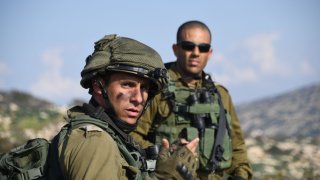The U.S. and Israel Negotiate Over the Fate of Hamas’s Last Bastion
It is in Washington’s best interest to back Israel’s Rafah operation as it would minimize civilian casualties and ensure the success of the operation.
Six months into the war with Hamas, throughout which Jerusalem has mostly managed to keep Washington on-side, Israel’s proposed IDF operation in Rafah is now testing American patience.
However, the best thing for Israelis and innocent Gazans is for the IDF to get as many civilians out of harm’s way as possible and crush Hamas’s last bastion in Rafah. Once this is done, the U.S. and international partners will have a better chance at safely transporting much-needed aid into Gaza.
To defeat Hamas in Gaza, Israel must stem the flow of weapons into the enclave. Rafah is the known entry point of weapons that are smuggled via tunnels reaching from Egypt’s Sinai desert into Gaza. Ensuring that the Hamas weapons smuggling routes are closed and remain closed will require Israel’s military engineers to enter Rafah and seal the subterranean smuggling routes.
But this is not the only reason the IDF must capture Rafah. In February, IDF Spokesman Daniel Hagari confirmed suspicions that Israeli hostages are being held in the southern Gaza city. To rescue the remaining 130 hostages while minimizing collateral damage, the IDF must clear as many Gazan civilians out of Rafah as possible.
Jerusalem assesses that up to 8,000 terrorists are hiding among the civilian population in Rafah, including as many as 1.4 million displaced Gazans. Among their numbers are likely the two most wanted Hamas leaders, Yahya Sinwar and Mohammad Deif, believed to be the architects of the October 7 massacres.
If Sinwar or Deif walk away from this conflict with even a remnant of Hamas’ military structure intact, Hamas will declare victory. Then, it will only be a matter of time before the terror organization reconstitutes its fighting forces and renews attacks against Israel. Hamas has said as much.
Israeli Prime Minister Benjamin Netanyahu said that he has decided on a date for a military operation in Rafah and that his government is working on the evacuation plan for civilians. According to Israeli media, preparations are underway to house large numbers of relocated Gazans. It is also likely that Israel will allow some to return to regions secured by the IDF, including in Gaza’s north. However, first, Israel must strengthen aid distribution mechanisms in central and northern Gaza.
Israel can move people gradually, block by block, the way it operated in the early months of the war. The task is enormous but not insurmountable.
The United States and others have expressed concerns regarding Israel’s plans for Rafah. Washington and Jerusalem are now in talks regarding what an operation would look like. These meetings are critical as there is no doubt that an operation in Rafah will have more success with U.S. support.
The sooner Israel finishes the job in Rafah, the sooner the United States and other international organizations can safely convey large quantities of much-needed aid into Gaza.
Hunger is an issue in Gaza today. Aid agencies have warned that the situation will get worse unless more aid reaches Gazans. The problem is at its worst in the north, where hundreds of thousands remained in place despite being urged by the IDF to evacuate south to safer ground. According to Israel, there is “no limit” on the amount of aid that enters Gaza, but the problem lies with the distribution of aid and delivering resources to the people who need it most. Multiple aid convoys have been attacked by gunmen or overwhelmed by Gazans in desperate need of aid, creating deadly situations.
Establishing safe corridors to distribute assistance will require manpower and resources; neither are safe to flow into Gaza until the terrorists are out of the picture.
In his March State of the Union address, President Joe Biden announced that he would direct the U.S. military to build a pier off the coast of Gaza to facilitate aid entry and ease the humanitarian crisis in the enclave. In response, twelve members of the Senate Armed Services Committee wrote a letter to the president expressing concerns that this mission would endanger U.S. troops.
The mission will be all the more dangerous if thousands of Hamas terrorists and their top leaders remain a threat in Rafah, well within rocket range of the proposed pier. The tragic, unintentional killing of seven World Central Kitchen staff in Gaza by IDF fire earlier this week highlights the dangers of operating in a war zone.
To protect the lives of the estimated 1,000 U.S. men and women in uniform who will administer the humanitarian effort and the many more needed, the IDF must finish the job in Rafah and channel its efforts into securing humanitarian pathways and working with partners to strengthen aid distribution mechanisms.
The United States should back Israel’s Rafah operation and work with the Jewish state to move civilians to safer ground. Only then can Gazans begin the enormous task of rebuilding with help from the international community.
Enia Krivine is the senior director of the Israel Program and the FDD National Security Network at the Foundation for Defense of Democracies. Follow her on X at @EKrivine.
Image: Shutterstock.com.

